Big Cartel vs Shopify: which is best for you?

Deciding between Big Cartel vs Shopify for your ecommerce platform? Why not throw Sellfy into the mix too?
Sellfy offers a budget-friendly solution packed with awesome features, like built-in marketing tools and seamless digital product sales, that might just outshine the others.
In this post, we’ll break down what Big Cartel and Shopify bring to the table, covering everything from their history and ease of use to customization options (e.g. a website builder) and pricing.
And, if you stick around, you’ll see why a Shopify alternative like Sellfy could be the perfect fit for your online store.
Ready to find the best ecommerce platform for your business? Let’s dive in and discover which one suits your needs best!
Big Cartel vs Shopify: background of each platform
Before we get into the nitty-gritty details of Big Cartel vs Shopify, let’s take a quick trip down memory lane to understand where these platforms came from and how they’ve evolved.
Knowing their backstories and what they each focus on can really help you see which one might be the perfect match for your business.
Big Cartel and Shopify both have unique histories and have grown in different directions, which influences what they offer today.
By getting a handle on their pasts, you’ll be better equipped to compare their current features and figure out which ecommerce platform aligns best with your needs.
Big Cartel
Founded in 2005 by musician Matt Wigham, this ecommerce platform was born out of a genuine need for something better. Matt, like many independent artists, found existing ecommerce solutions either too complicated or too pricey for small-scale sellers.
So, he set out to create a simple and effective way for creatives to sell their merchandise online. And voilà, Big Cartel came to life.
Over the years, Big Cartel has stayed true to its roots, focusing on the needs of artists, makers, and small-scale sellers. Its user-friendly interface and straightforward pricing have made it a hit among creative entrepreneurs who value simplicity and affordability.
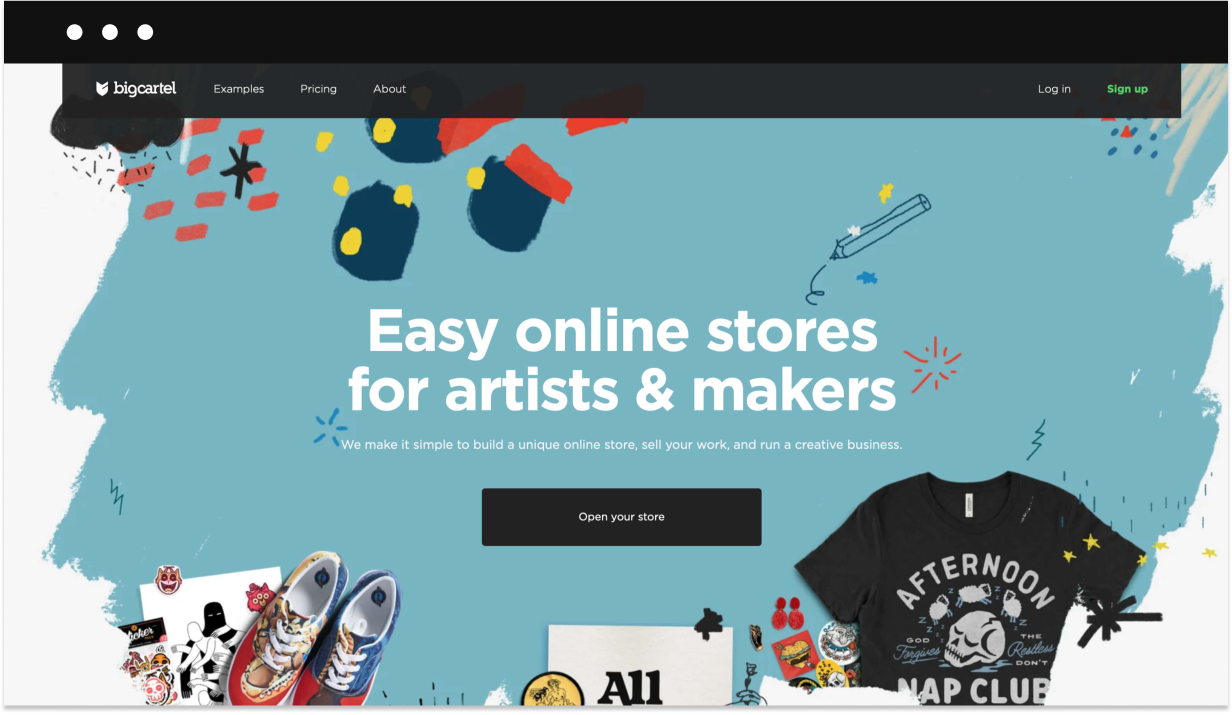
Think of it as the go-to ecommerce platform for anyone looking to set up an online store without diving into the deep end of technical know-how.
Big Cartel’s charm lies in its dedication to its niche market. They’re all about making life easier for independent artists and small business owners.
With features like customizable Big Cartel themes, expanded integration capabilities, and enhanced mobile responsiveness, they’re continually evolving to meet the needs of their users.
Plus, their transparent pricing model with no hidden fees is a breath of fresh air. It’s no wonder Big Cartel has built such a loyal customer base among independent creators who crave cost-effective solutions for selling their products online.
Shopify
Did you know that Shopify, the ecommerce giant we all know, originally started out as an ecommerce platform to sell snowboarding gear?
Launched in 2006 by Tobias Lütke, Daniel Weinand, and Scott Lake, Shopify has come a long way from its snowboarding roots to become one of the top ecommerce platforms in the world.
What makes Shopify so popular? Well, for starters, it’s incredibly versatile. Whether you’re a budding entrepreneur or a massive enterprise, Shopify has got you covered.
Its robust feature set, extensive Shopify app store, and scalability have made it a go-to for online merchants everywhere. And let’s not forget about Shopify Payments and Shopify Plus—two game-changing innovations.
Shopify Payments, an integrated payment gateway, simplifies transactions by eliminating the need for third-party processors. This is a huge win for new sellers who want a hassle-free setup.

On the other hand, Shopify Plus, launched in 2014, is tailored for high-volume merchants and offers advanced features like customizable checkouts, top-notch security, and dedicated support.
But, that’s not all:
What truly sets Shopify apart is its commitment to continuous innovation. With regular updates and new features, Shopify ensures that businesses can stay ahead of industry trends and adapt to the ever-evolving ecommerce landscape.
Plus, the platform’s extensive app store, packed with thousands of third-party applications, allows users to add a variety of functionalities to their stores—from advanced analytics to marketing automation tools.
This flexibility means that no matter your business size or industry, you can customize Shopify to fit your unique needs. So, whether you’re just starting out or scaling up, Shopify is designed to grow with you.
Ease of use
Setting up an online store on Big Cartel is incredibly straightforward and user-friendly. To get started, all you need to do is pick a pricing plan, sign up with some basic info, and choose a theme.
The whole process is designed to be quick and simple, which is perfect for those of us who aren’t tech-savvy. This makes Big Cartel especially appealing to artists and small business owners who might not have a lot of technical knowledge or resources.
Big Cartel’s minimalist design isn’t just about aesthetics; it’s about making the setup process as painless as possible. You can focus on getting your products online without being overwhelmed by complex features.
The interface is clean and intuitive, allowing you to manage your products, orders, and settings with ease. This simplicity is one of Big Cartel’s main selling points, which makes it a great choice for anyone who prefers a no-frills approach to online selling.
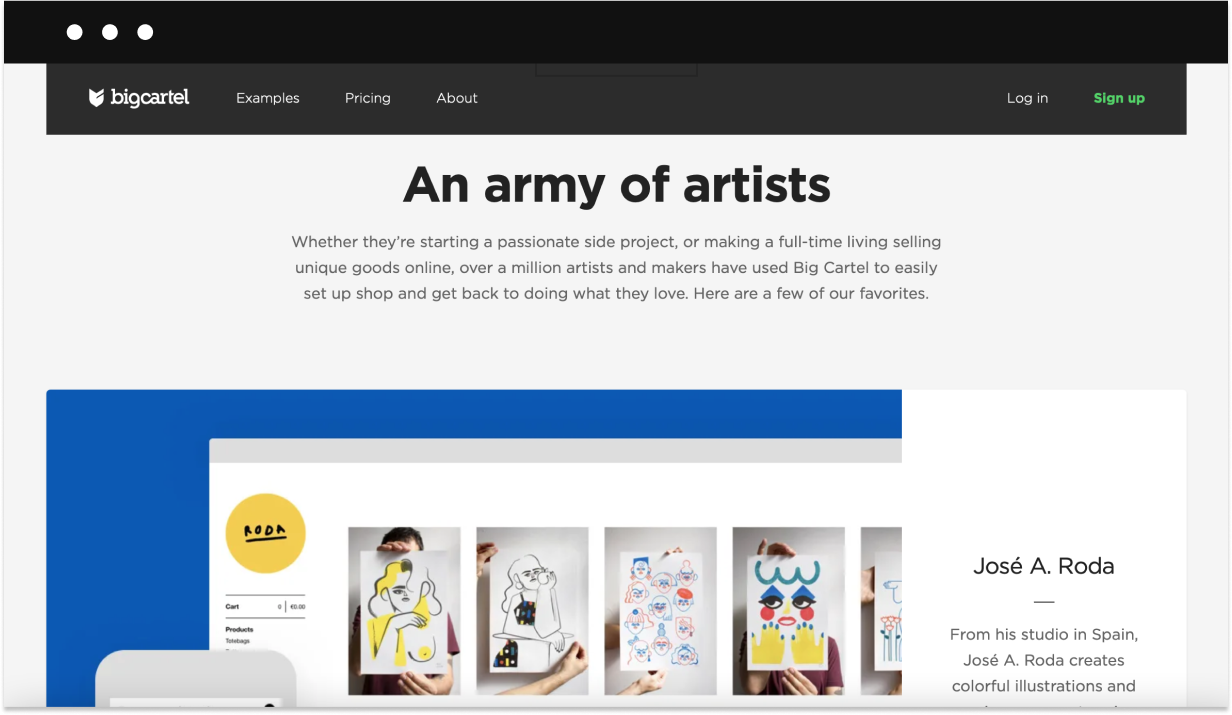
On the flip side, Shopify offers a more comprehensive setup wizard that guides you through every step—from domain registration to Shopify theme selection and product uploads.
While it may seem more complex at first, this guided approach ensures that you cover all the essential elements. Shopify’s setup process is thorough and detailed, which can be a lifesaver for first-time ecommerce entrepreneurs.
The platform’s feature-rich interface offers extensive customization options (like, a website builder) and a detailed dashboard with analytics and reports.
While this might result in a steeper learning curve, it provides a robust toolset for managing and growing your online business. User reviews often highlight that Big Cartel is easier to master for beginners due to its simplicity.
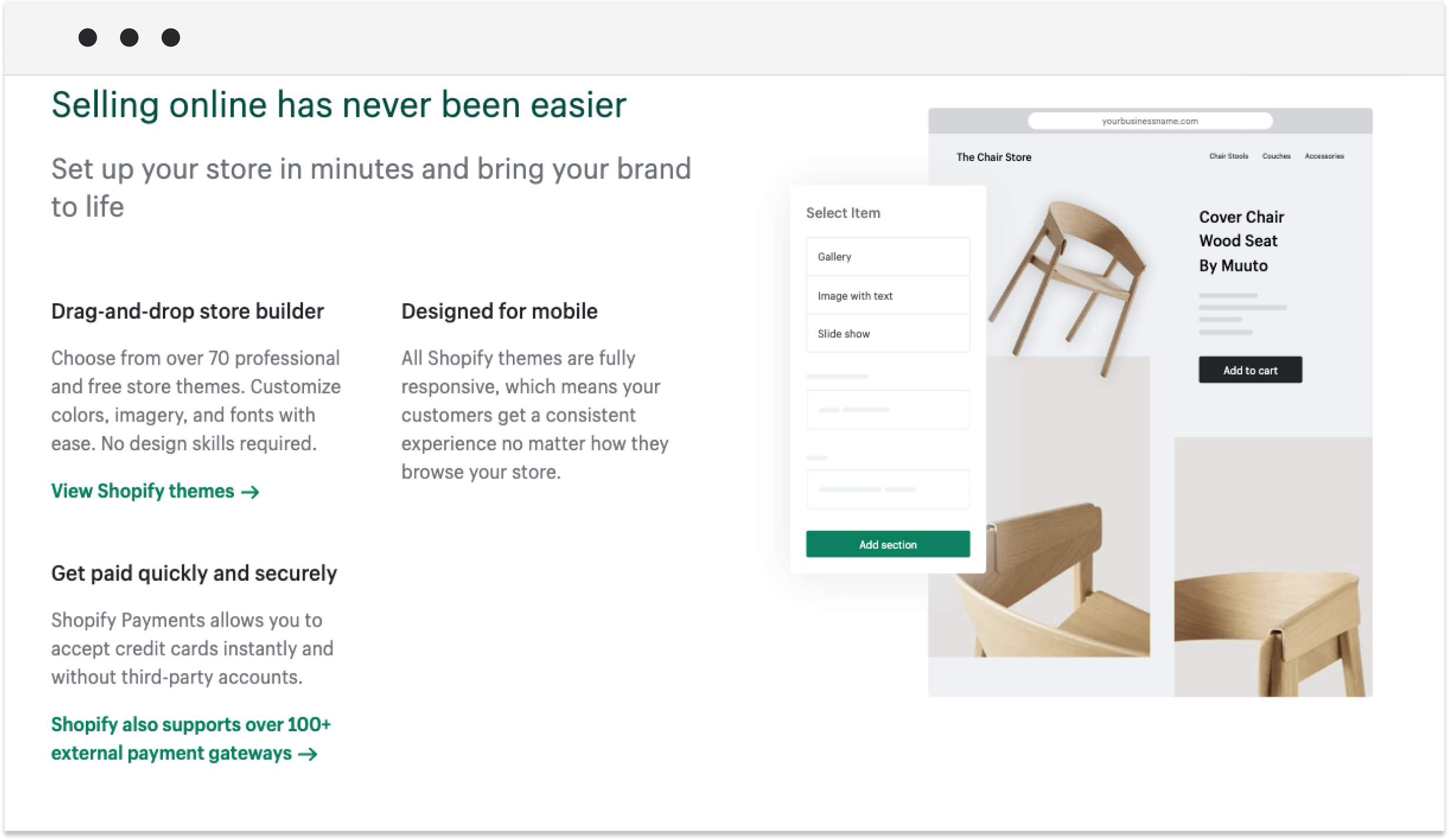
However, Shopify, despite its complexity, offers extensive documentation and support to help users get up to speed. The initial learning curve might be steeper, but the long-term benefits of its advanced features can make it worth the effort.
Shopify’s support resources, including a comprehensive help center, video tutorials, and 24/7 customer support, ensure you have all the assistance you need.
Plus, the Shopify community forum is a great place to ask questions and share tips with other Shopify merchants.
In summary, if you’re looking for a quick and easy setup, Big Cartel is an excellent choice.
But if you’re willing to invest the time to learn a more robust ecommerce platform, Shopify offers a powerful feature set and extensive support to help you grow your online business.
Customization & design
Big Cartel gives you a handful of free themes that you can tweak a bit. This is perfect if you’re running a smaller shop and just need something quick and easy to get started.
These themes are pretty straightforward and appeal to artists and small business owners who want to set up their online store without hassle.
You can change basics like colors, fonts, and images, but if you’re looking to make bigger changes like altering the layout or adding advanced features, you might need some coding skills or external tools.
On the other hand, Shopify really shines with its theme options. They’ve got a huge collection of both free and premium themes that are super customizable. Plus, every theme is mobile-responsive, which is a must-have in today’s mobile-first world.
Shopify’s drag-and-drop editor is a game-changer—it makes it easy to personalize your site without touching a single line of code.
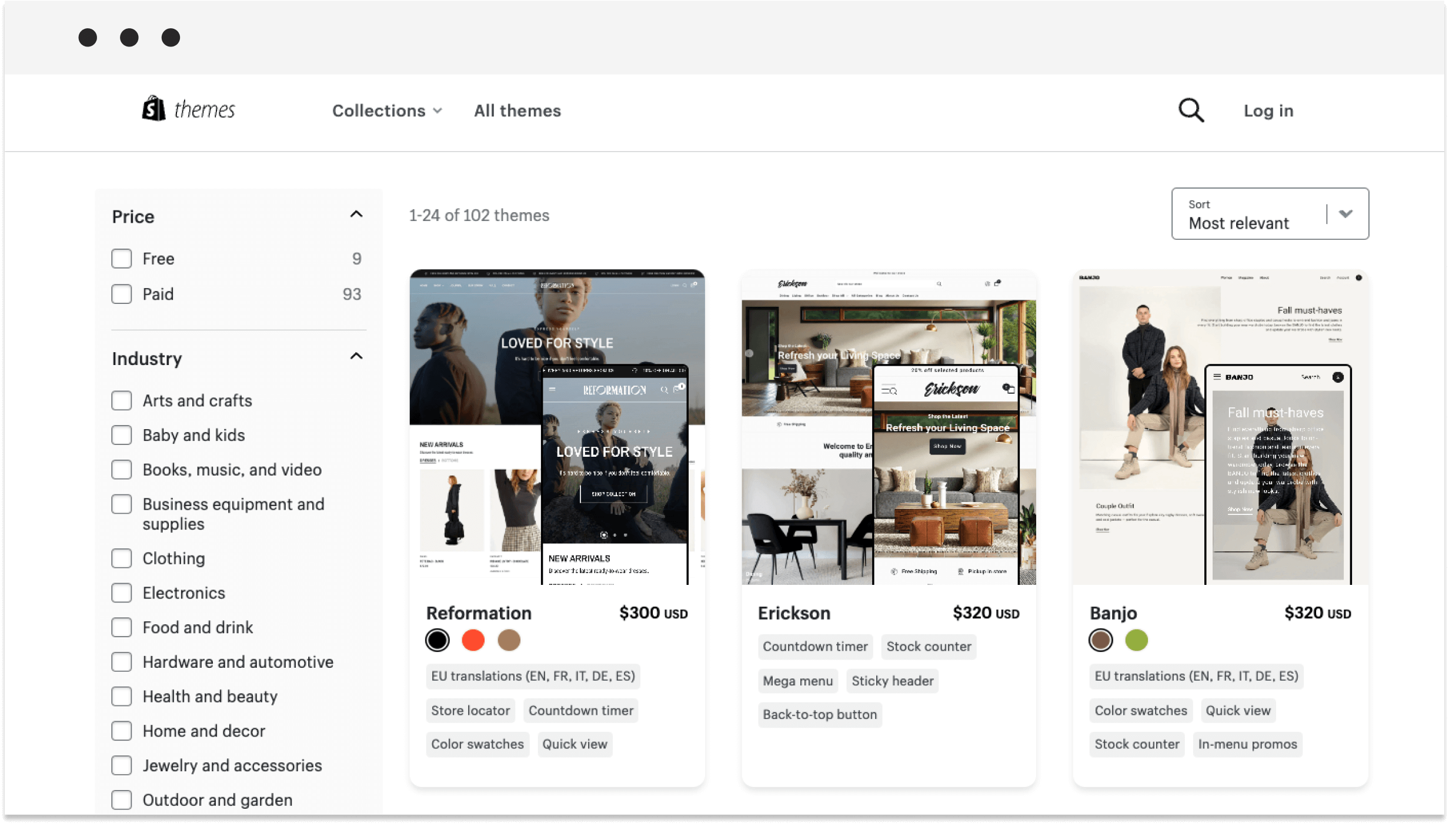
But if you’re the type who loves to get into the nitty-gritty, you can access the theme’s HTML, CSS, and Liquid template language to really make it your own. This is great for businesses aiming to create a unique, branded shopping experience.
When it comes to checkout processes, Shopify again takes the lead with more advanced options. Think multi-step and single-page checkouts, abandoned cart recovery, and seamless integration with various payment gateways.
These features can make the checkout process smoother, and help to reduce cart abandonment and increase conversion rates. Big Cartel keeps it simple, which can be great if you prefer a no-frills approach.
Its minimalistic design is in line with its overall philosophy of simplicity and ease of use, which fit small business owners or independent artists who don’t need complex checkout options.
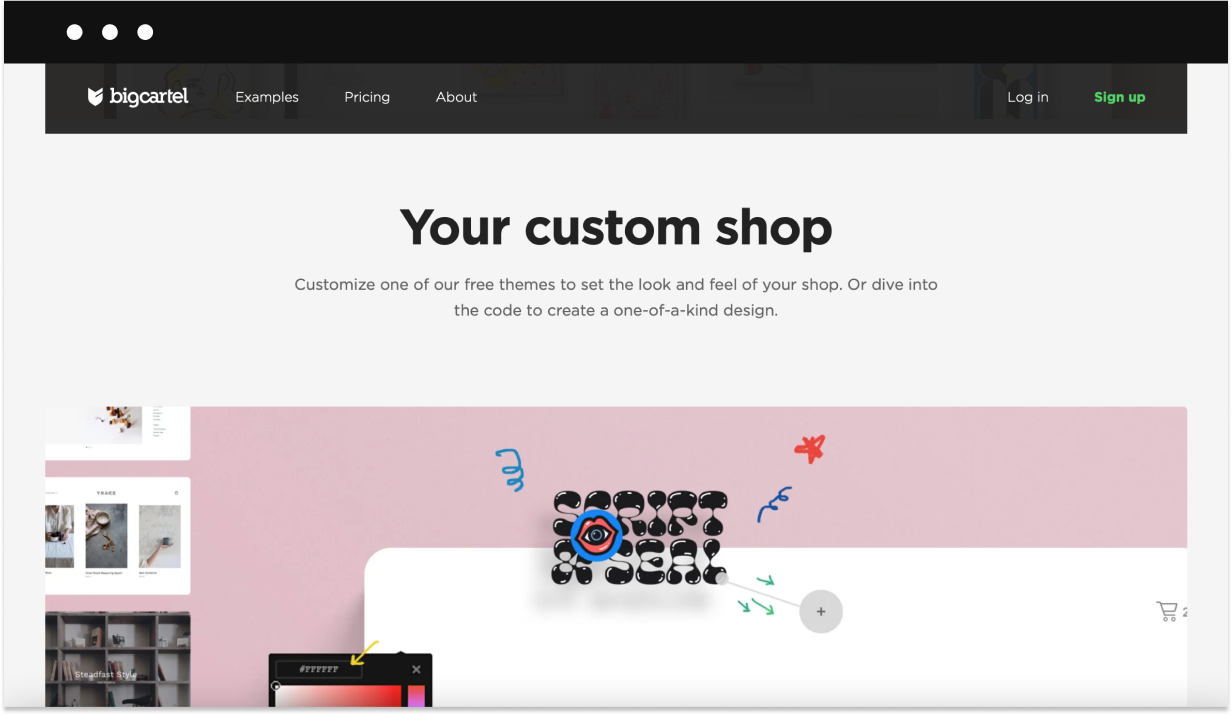
To wrap it up, while Big Cartel offers a straightforward and user-friendly ecommerce platform with basic design website builder, Shopify stands out with its extensive theme library, advanced customization capabilities, and overall flexibility.
So, if you’re looking to build a highly customized, professional online store that can grow with your business, Shopify may just be the better choice for you.
Features & tools
When it comes to building your online store, both Big Cartel and Shopify have got your back with essential ecommerce features like SEO tools, mobile compatibility, and multi-channel selling.
But, let’s be real—Shopify’s SEO tools are simply better. They offer greater control over metadata, sitemaps, and URL structures, which makes it easier to optimize your online store for search engines and boost your visibility.
Shopify also nails mobile optimization. With so many shoppers browsing on their phones, having a mobile-optimized store is a game-changer.
But, the perks don’t stop there. Shopify is packed with advanced features designed to boost your revenue. For example, their upselling and cross-selling tools can suggest related products or higher-end alternatives to increase the average order value.
Then, they have abandoned cart recovery, which automatically sends follow-up emails to customers who leave items in their cart.
And, let’s not forget the extensive checkout page customization that lets you tailor the checkout experience to fit your brand and reduce cart abandonment.
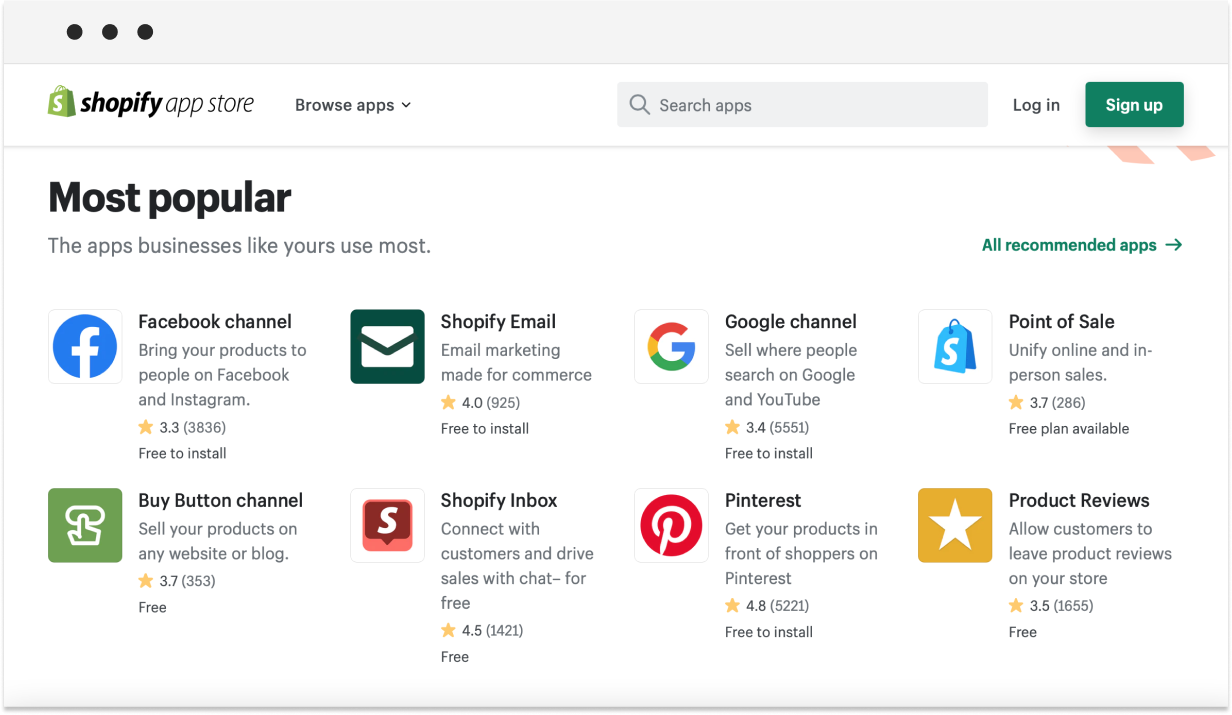
On the flip side, Big Cartel is more straightforward but still offers some handy features for promoting products and tracking sales. You get basic SEO tools, social media integration, and simple analytics to monitor your sales.
However, it doesn’t come with the same advanced marketing capabilities as Shopify. For instance, there’s no built-in abandoned cart recovery or sophisticated upselling and cross-selling tools, which can make it harder to implement complex marketing strategies.
One of Shopify’s standout features is its app store. With thousands of apps available, you can find tools for almost any function—from Shopify email marketing and social media integration to inventory management and customer service.
This vast ecosystem allows you to customize your online store extensively, adding functionalities tailored to your specific needs. Popular tools like Mailchimp for email campaigns, Oberlo for dropshipping, and various SEO plugins are all at your fingertips.
Big Cartel, on the other hand, offers a more limited selection of integrations, mainly focusing on essential tools that support independent artists and small sellers.
While it does integrate with platforms like Google Analytics, Facebook, and PayPal, the range of available apps and extensions isn’t as extensive as Shopify’s.
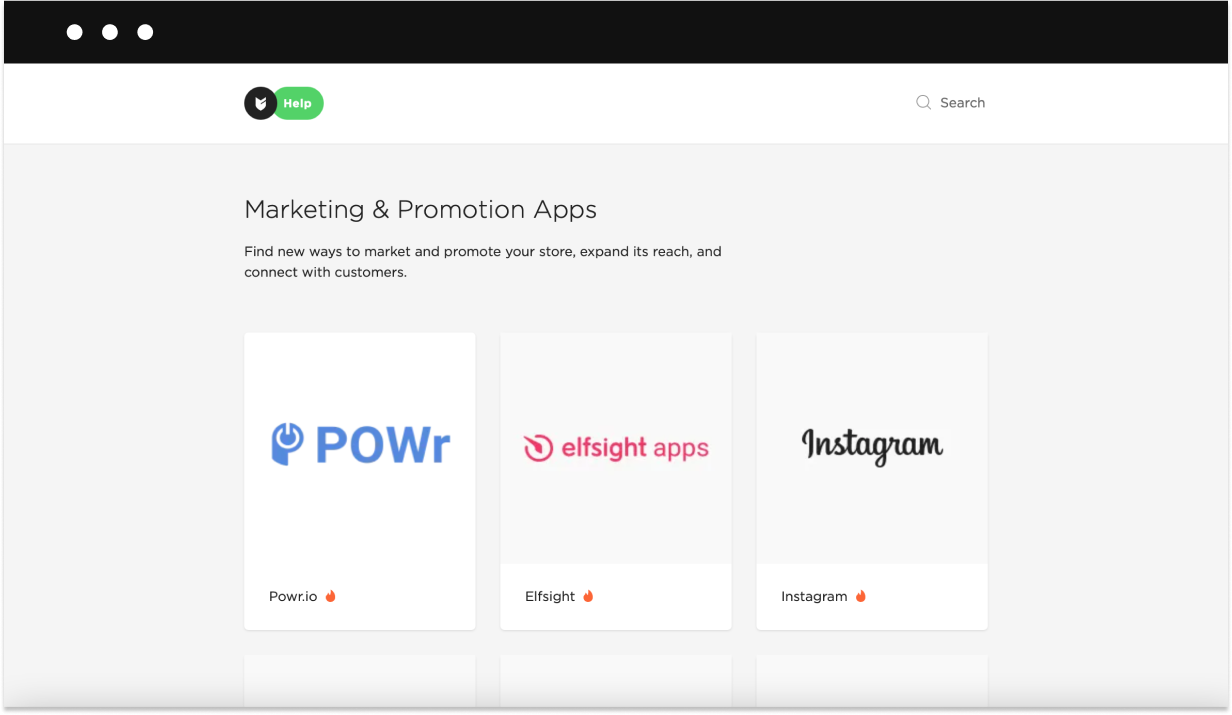
This can be a drawback if you’re looking to scale your business and add more complex functionalities to your online store.
In a nutshell, while both platforms cover the basics of ecommerce, Shopify’s advanced features and extensive app store make it a more robust and scalable solution for businesses aiming to grow and optimize their online presence.
Big Cartel, with its simpler and more streamlined set of tools, is a solid choice for independent artists and small sellers who prioritize ease of use over advanced capabilities.
Pricing & plans
Big Cartel has a free plan that lets you list up to five products, which is an excellent option for those starting small without wanting to commit financially.
You’ll get some handy basic features, including customizable themes, sales tracking, and payment processing with PayPal and Stripe.
On the other hand, Shopify doesn’t have a free plan but offers a 3-day free trial so you can explore its features before committing. This trial period is great for those who want to dive deep into what Shopify has to offer.
Once the trial is up, Shopify pricing plans start at $29 per month for the Basic Shopify plan, which includes a bunch of features like a website and blog, unlimited products, discount codes, and 24/7 support.
If you need more, higher-tier plans like the $79 per month Shopify plan and the $299 per month Advanced Shopify plan come with extras like professional reports and advanced shipping options.
When it comes to transaction fees, the platforms differ. Big Cartel’s paid plans don’t tack on transaction fees, although you’ll still face fees from PayPal and Stripe.
Shopify, however, charges transaction fees on all plans unless you use Shopify Payments, their in-house gateway. For example, if you go with an external payment gateway, expect a 2.0% fee on the Basic Shopify plan, which drops to 1.0% on the Advanced Shopify plan.
These fees can add up, especially for high-volume sellers.
For startups and small business owners, Big Cartel’s pricing is straightforward and budget-friendly, making it an appealing choice. Their paid plans range from $9.99 per month for up to 50 products to $29.99 per month for up to 5,000 products.
This clear structure helps businesses scale without hidden costs. Shopify, though pricier, offers a broader range of features and greater scalability, which makes it a solid option for businesses aiming for significant growth.
Advanced features like abandoned cart recovery, detailed analytics, and extensive app integrations justify the higher cost for many. Plus, for high-volume merchants needing custom solutions, there’s Shopify Plus starting at $2,000 per month.
So, if you’re a small-scale seller, Big Cartel’s free and low-cost plans might be just what you need. But if you’re looking to grow and expand, Shopify’s tiered pricing and advanced features might offer better value.
Consider your business’s specific needs and future goals to determine the best fit for you.
Customer support
Starting with Big Cartel, users generally find their customer support pretty decent. They offer support through email and have a comprehensive help center loaded with articles and guides.
This can be a lifesaver for those of you who prefer to troubleshoot on your own. The email support is often praised for being helpful and thorough, although it might not always be lightning-fast, especially during peak times or after hours.
Big Cartel also makes an appearance on social media, where you might score some quick responses, but the lack of real-time support like live chat or phone support can be a bit of a bummer if you need help ASAP.
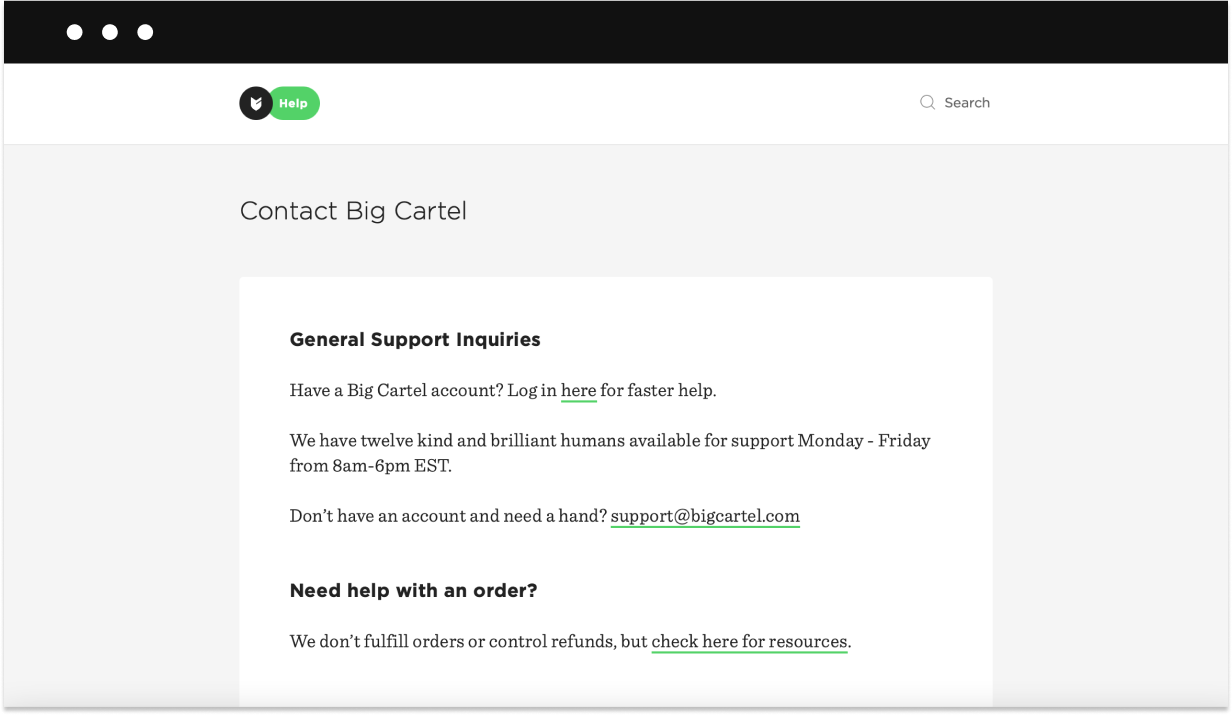
On the flip side, Shopify really shines in the customer support department. They offer 24/7 support via email, live chat, and phone, meaning you can get help whenever you need it, no matter where you are or what time it is.
Shopify’s support team is known for their speedy responses and helpfulness, often going above and beyond to provide detailed solutions. Plus, they’re friendly and professional, which is always a bonus.
Like Big Cartel, Shopify also has a robust help center, but it comes with an even wider range of articles, tutorials, and video guides.
Not to mention, they have a buzzing community forum where users can share tips and ask questions, fostering a sense of camaraderie among Shopify store owners.
For those on higher-tier plans like Shopify Plus, there’s priority support, ensuring that high-volume merchants get the fastest and most comprehensive assistance. This is crucial for larger businesses that can’t afford any downtime.
The big question isn’t Big Cartel vs Shopify—it’s why not Sellfy?
While Big Cartel and Shopify are both strong contenders in the ecommerce space, Sellfy offers a compelling alternative. Let’s dive in and see why Sellfy might just be the game-changer you need.
First off, let’s talk dollars and cents. Sellfy is all about giving you bang for your buck. With plans starting at just $22 per month, Sellfy offers a suite of features that won’t break the bank.
This is a big win for small business owners, creators, and entrepreneurs who need to keep costs down while still having access to essential tools.
Compared to Big Cartel vs Shopify, Sellfy’s pricing is super competitive, especially when you consider the breadth of features included.
Now, if sales features and marketing is your thing, Sellfy’s got your back. It comes with built-in marketing features that make life a lot easier.
Unlike Big Cartel, which offers limited sales features, and Shopify, where you often need to add extra apps (and costs), Sellfy has it all ready to go. Email marketing, discount codes, upselling, product bundling—you name it.
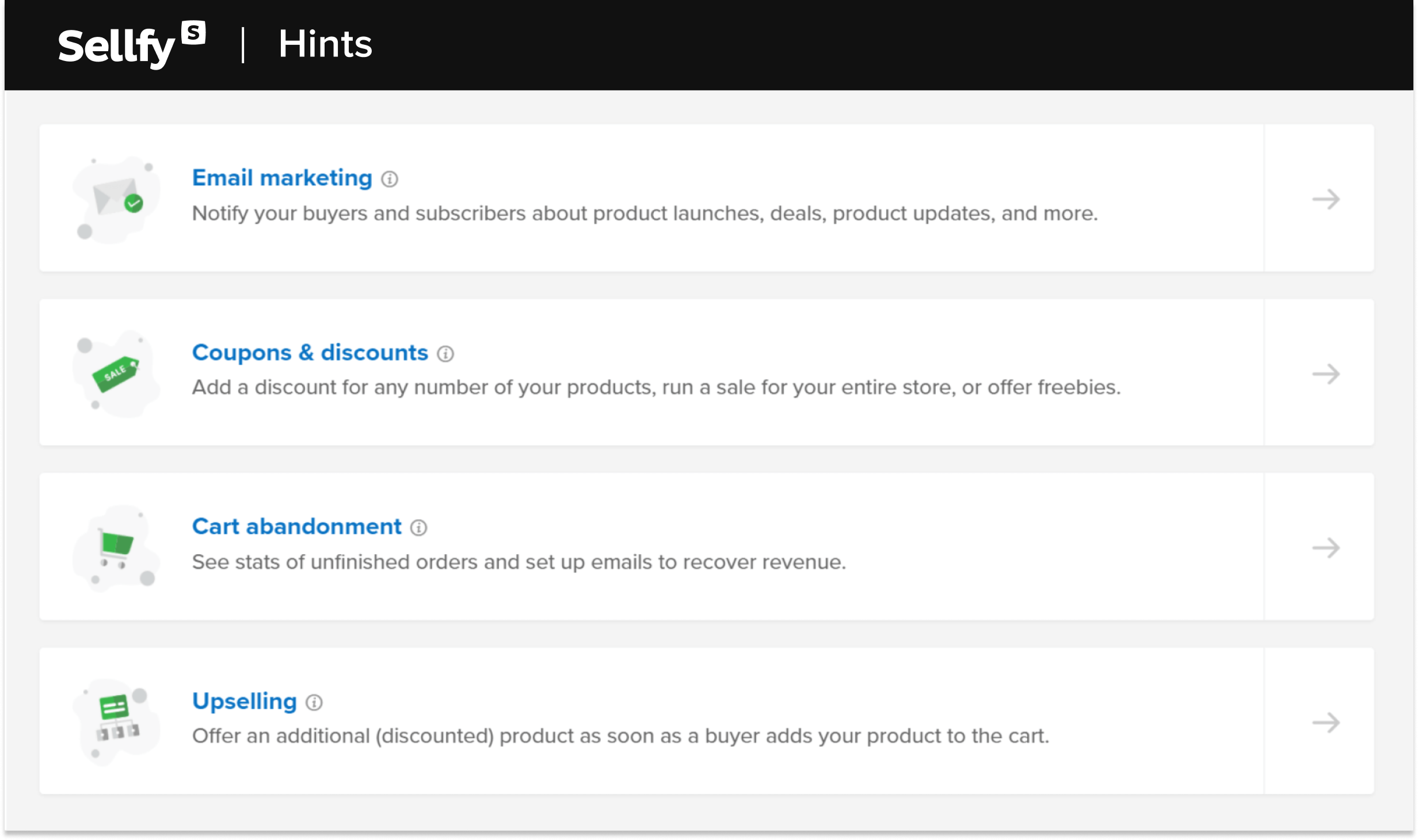
Everything you need to boost your sales is included, which means less time juggling multiple platforms and more time growing your business with sales features.
For all you digital creators out there, Sellfy excels at selling digital products. Whether it’s eBooks, music, videos, or other digital goods, Sellfy makes it super easy to manage and deliver your products to customers.
While Shopify does offer digital product sales, it often requires extra apps or workarounds. With Sellfy, it’s all built-in and seamless, which makes it a breeze for anyone focused on digital content.
Also, let’s not forget about usability. Sellfy’s interface is designed to be intuitive and straightforward. So, whether you’re a newbie or a seasoned pro, you’ll find it easy to navigate and set up your online store.
This simplicity means you can get up and running quickly without the steep learning curve that sometimes comes with more complex platforms like Shopify.
When it comes to the best website builder, Sellfy strikes a nice balance. While Big Cartel offers limited themes and Shopify gives you extensive web design flexibility, Sellfy offers customizable storefronts that are easy to tweak to match your brand’s unique style.
This flexibility is available for both digital and physical products, allowing you to create a cohesive brand experience.
And, if you’re ready to go global? Sellfy supports multi-currency and multi-language capabilities, which makes it easier to reach a worldwide audience. Plus, it integrates seamlessly with social media platforms like Facebook, Instagram, and YouTube.
This means you can leverage these massive user bases to drive traffic to your online store.
When you need help, Sellfy’s got you covered with robust customer support, including a comprehensive knowledge base aka help center, live chat, and email support.
Their active community of users and creators also provides valuable insights and assistance, which fosters a collaborative environment where you can grow and learn.
So, while Big Cartel and Shopify each have their strengths, Sellfy stands out as a versatile and cost-effective alternative. Its built-in marketing tools, ease of use, and strong support for digital products make it a top choice for many businesses.
Conclusion
Choosing between Big Cartel vs Shopify can feel like a big decision, but it all boils down to what your business truly needs and where you want to go.
If you’re an independent artist or a small-scale seller looking for something straightforward and budget-friendly, Big Cartel might just be your new best friend. It’s super simple to use and won’t break the bank, which is always a plus.
Now, if you’re dreaming big and aiming to scale up your business with all the bells and whistles, Shopify could be the way to go. It’s packed with advanced features, offers excellent scalability, and has customer support to help you every step of the way.
Ultimately, the best ecommerce platform for you will depend on your specific needs and goals, but Sellfy’s comprehensive offering makes it a strong contender worth considering.
If balancing cost and functionality is your aim, Sellfy might just be the perfect fit for your ecommerce venture. So, take a moment to think about what you really want to achieve, and you’ll be well on your way to making a choice that feels just right for you.






